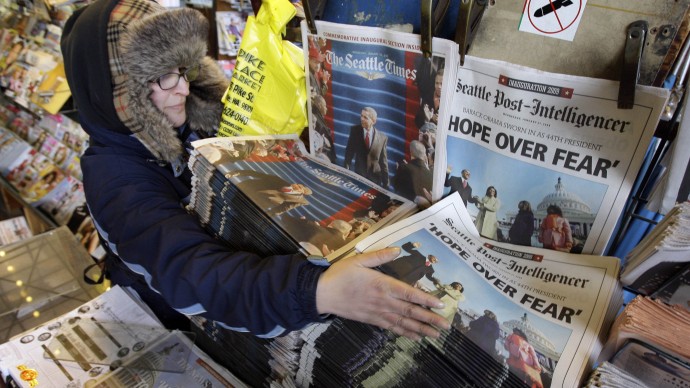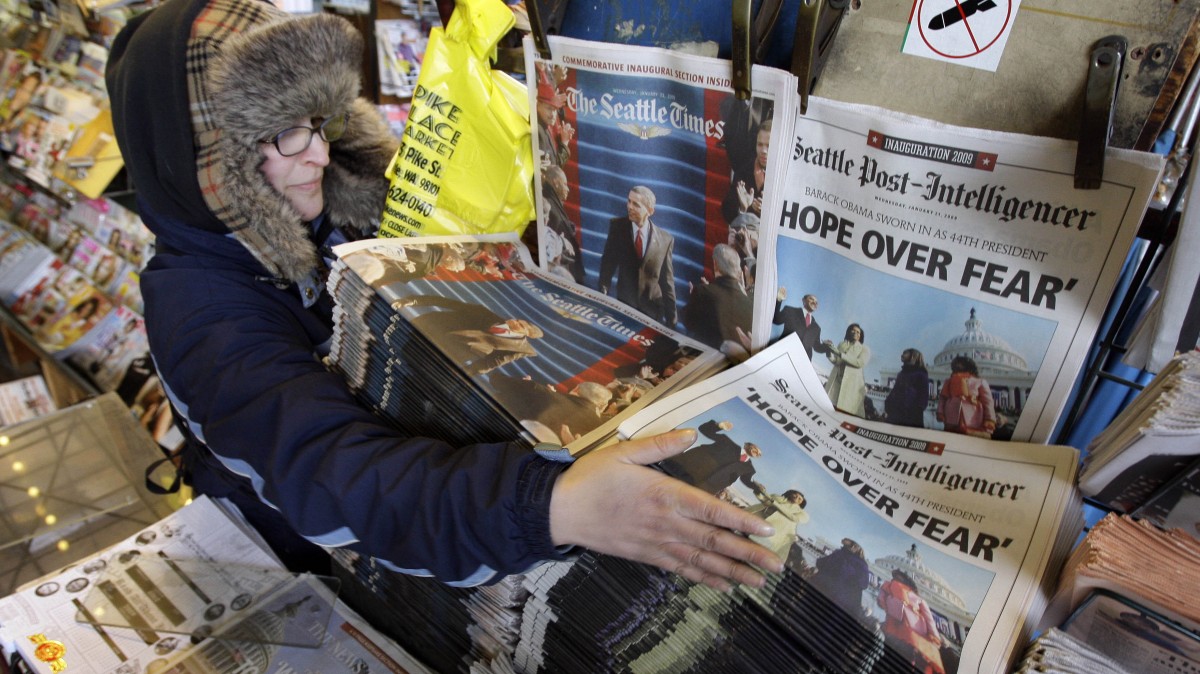
(MintPress) – In Sunday’s edition of the Winston-Salem Journal, the newspaper’s editorial board gave President Barack Obama its full endorsement for November’s upcoming election. It was the first time since 1964 that the publication gave the nod to a Democrat – Lyndon Johnson at the time. But political endorsements by media publications come with a varying degree of both ethical debates and effectiveness. Traditionalists often see the practice as a way to put months of research to work while demonstrating their role as a civic leader. Others argue that showing support during election season stokes a political bias from a source of media that is otherwise meant to be objective.
The practice of endorsements is as old as news reporting in America itself. From the 19th century until today, endorsements have meant funding contributions to campaigns, advertisements for candidates and, most commonly, opinion pieces written by the editorial staff declaring support for a candidate. In America’s infancy, many newspapers in circulation were owned by political parties, often times making them more propaganda than practical. The publications used the space to talk up the attributes of their esteemed candidate with the intention of swaying a vote in their favor.
Today, however, newspaper ownership is very much out of the hands of politicians and at the helm of those with political and ideological differences. Yet, upward of 30 percent or more of newspapers across America continue to endorse both local and national politicians before major elections. That leaves around two-thirds of publications opting out of a show of support for a candidate, and according to Kathleen Hall Jamieson, it’s for a simple reason: Endorsements simply are not that effective.
Jamieson, the director of the Annenberg Public Policy Center at the University of Pennsylvania, said there is rarely a tangible result of a newspaper’s endorsement. She pointed to a study done during the 1996 presidential election, in which a mere 1 percent of respondents polled said their newspaper’s endorsement played a “great deal” in their voting habits. Only 10 percent said it played “somewhat” of a role in how they voted.
“The direct effect of editorials does not appear to be significant enough to find,” Jamieson told the American Journalism Review. “The effect of newspaper endorsements is largely created through advertising about them that is sponsored by the candidate. … Many Americans in 1996 had no idea which presidential candidate their newspaper supported; many more had the wrong idea.”
A ‘Second City’ split
The furor of the endorsement debate has manifested itself in Chicago, Ill., where the city’s two competing newspapers recently adopted different policies on their role of backing a candidate. At the Chicago Tribune, its editorial staff published a letter in January explaining why they endorse political candidates. The editorial noted that newspapers make up such a strong part of life in Chicago that they essentially become a part of public citizenry. The publication said it tries to “provide guidance” for those who feel they are on the fence with their vote or do not feel informed enough on a decision.
“We want to inform our readers and encourage them to push an agenda for a more vital community. The most direct way they do that is in choosing who will lead their government,” the Chicago Tribune said. “In our editorials, we explain what we think should be done about government pension costs, educational shortcomings, political dysfunction and more. … Not least important, we endorse candidates, from the top of the ballot to the bottom. To arrive at our choices, we send out questionnaires, scrutinize voting records and public statements, and interview hundreds of candidates. We make our evaluation of which ones will best serve the interests of the public. And then we tell our readers.”
The Tribune also noted that it has no way of gauging its effectiveness of endorsements, but said that it does not matter how they are interpreted or their influence – they will continue to publish them. The same cannot be said for the other big player in town, however. Also in January, the Chicago Sun-Times implemented a new policy that saw the newspaper end its tradition of political endorsing. The Sun-Times said that it is simply a matter of practicality: With research showing that opinions pages do little to sway votes and the multitude of news sources in the digital age, the practice can be seen as pretentious.
The publication said readers would be better served with clear and concise political reporting, rather than opining. The newspaper likened endorsements to partisan news coverage on cable television, which it said only serves the confirmation bias of its target demographic.
“Most good newspapers today attempt to appeal to the widest possible readership, including people of every political persuasion, by serving up the best and most unbiased news coverage possible. They want to inform you, not spin you,” the Sun-Times wrote. “ … We will provide clear and accurate information about who the candidates are and where they stand on the issues most important to our city, our state and our country.”
Is a ‘fix’ needed?
TIME Magazine managing editor Richard Stengel has a theory of where criticisms of endorsements stem from: They’re all generational. Stengel believes that those who have not spent their whole life around newspapers are raising the issue because it does not fall in line with the rest of the media they are consuming. Newspapers are original in that they are one of the very few news outlets that regularly endorse political candidates based on years of tradition.
“Young news consumers are suspicious about traditional authority. They prize objectivity, straightforwardness and transparency … and most of the ones I talk to ask the following: How can a newspaper be objective on the front page when it endorses a candidate on the editorial page?” Stengel noted. “A free press, as Jefferson noted, is part of our system of checks and balances; it is one of the few guarantors of democracy. But for the press to remain free, we need to preserve both the reality and the appearance of that freedom, and endorsements undermine that.”
For Emily Gruenke, the practice isn’t as much about as telling people who to vote for, but rather creating dialogue and conversation within the community that touch on important issues. Gruenke, an editor at the Albany Enterprise, a weekly newspaper in Central Minnesota, said that while her newspaper does not permit candidate endorsements, she personally sees their benefit. In an interview with MintPress, Gruenke said newspapers offer a forum for civil disagreement and that endorsements are a prime example.
“Voicing an opinion isn’t so much important to persuade others to your point of view, but it is important because it makes readers more vocal about their point of views,” Gruenke said. “It opens up discussions, because if a reader doesn’t like my column about gay marriage, they are more apt to write a response versus that column never being published at all. It could be interpreted as bias, but in reality, a paper is never truly objective. For the sake of intellectual conversations, I think it is necessary to have that bias once in a while, to stimulate the readers.”


